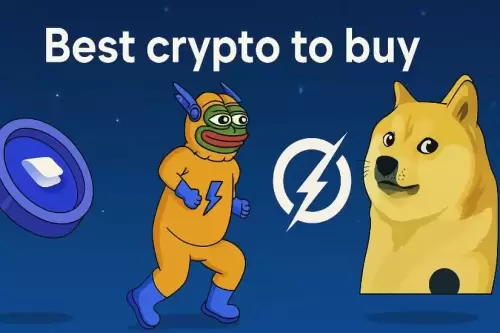 |
|
 |
|
 |
|
 |
|
 |
|
 |
|
 |
|
 |
|
 |
|
 |
|
 |
|
 |
|
 |
|
 |
|
 |
|
Cryptocurrency News Articles
Solaxy's (SOLX) Explosive Presale Reveals the Next Smart Contract Battleground
Apr 25, 2025 at 03:53 am
Bitcoin's rally is stalling near the $91K mark as indicators warn of bearish pressure. Meanwhile, investors shift focus to Layer 2 infrastructure, with Solaxy's ($SOLX) explosive presale revealing the next smart contract battleground.

Bitcoin’s rally may be hitting a snag.
After a brief respite from the volatility that began with President Donald Trump’s “Liberation Day” on April 2nd, Bitcoin’s price has recovered to just over $92,000.
However, new on-chain analysis and market indicators suggest that this upward momentum might be meeting its peak.
CryptoQuant’s head of research, Julio Moreno, points out a concerning uptick in 24-hour Open Interest (OI). The magnitude of the latest spike is the largest seen in recent months.
Chart: CryptoQuant
Historically, surges in OI, primarily driven by derivatives trading activity, have failed to sustain long-term bullish trends.
In previous bullish phases of the market, which saw more significant price rallies of 10% and 7%, we observed similar spikes in 24-hour Open Interest.
Despite the significant surge in OI, Bitcoin’s price realized only a 4.2% gain. This muted upside is an indication of substantial selling pressure.
The implication is that traders are likely utilizing the rally to offload their positions, which is a bearish signal. It suggests traders are exiting their trades to capitalize on the rally, rather than accumulating further.
A key resistance level is now forming between $92,000 and $93,000. This aligns with the Trader’s Realized Price, which transitions from support to resistance depending on the prevailing market sentiment.
Currently, the bull score stands below 40, implying a lack of strong conviction in the ongoing rally.
However, beneath the surface, a more optimistic narrative is unfolding. Bitcoin’s Realized Capitalisation, which is calculated based on the price at which each coin last moved, just reached a new all-time high of $872.2 billion.
This signals persistent accumulation by long-term holders, even amidst heightened short-term price volatility.
The widely recognized Bitcoin Rainbow Chart also showcases this mixed market sentiment.
As of April 2025, Bitcoin falls into the “Still Cheap” to “HOLD!” categories, indicating that the price is being valued moderately with potential for further upside.
But the chart also serves as a stark reminder: volatility is on the rise as we ascend into higher price bands, carrying greater levels of risk.
This becomes critical with Bitcoin’s price nearing key resistance and the need for firm infrastructure upgrades to support global-scale adoption.
That’s where Layer 2 infrastructure comes in and nowhere is that shift more evident than in the rise of Solaxy ($SOLX).
Solaxy’s $31M Presale Marks Turning Point For Solana’s Scalability
With Bitcoin’s rally hitting a snag and key indicators signaling bearish pressure, investors are turning their attention to the next stage of crypto’s evolution: Layer 2.
Solaxy, Solana’s first Layer 2 chain, has already raised over $31 million from investors and is quickly becoming a meeting point for developers and funders eager to solve issues of network congestion on Solana.
Recently launching its blockchain explorer in testnet, Solaxy provides greater transparency and user insight into Layer 2 transaction activity.
Built as a roll-up solution on Solana’s monolithic architecture, the explorer lays the foundation for bundling transactions off-chain and posting them to the mainnet in a compressed format.
The use case couldn’t be more urgent. Solana has become a powerhouse in NFTs and DeFi, boasting over $7.89 billion in total value locked (TVL) and a gaming ecosystem that attracts over 70 million monthly active users.
But with such high usage comes problems. Solana has been plagued by issues like outages, lag, and congestion.
Solaxy’s infrastructure is focused on precisely these issues, aiming for lower fees and higher throughput without compromising decentralisation.
Behind The Code: What Solaxy Is Building
The Solaxy dev team isn’t just fundraising – they’re building rapidly. Last week, the project announced major improvements to data storage speeds, now capable of 140 kilobytes per second on Solana’s mainnet.
They’ve also streamlined the command-line interface (CLI), providing a smoother experience for developers deploying on the network.
Solaxy is targeting 10,000 transactions per second (TPS), a mark that would place it alongside some of Ethereum’s top Layer 2s like Arbitrum and Optimism. For those in the Solana community who are used to the network’s stifling throughput and resulting latency, Solaxy offers a scalable, battle-ready alternative.
Cross-chain functionality is also in active development, with the team adding advanced permission controls and refining behaviours to ensure Solaxy applications mirror the functionality of native Solana programs. This is a crucial step as the platform prepares for its transition from testnet to full integration.
The $SOLX token, currently
Disclaimer:info@kdj.com
The information provided is not trading advice. kdj.com does not assume any responsibility for any investments made based on the information provided in this article. Cryptocurrencies are highly volatile and it is highly recommended that you invest with caution after thorough research!
If you believe that the content used on this website infringes your copyright, please contact us immediately (info@kdj.com) and we will delete it promptly.





























































